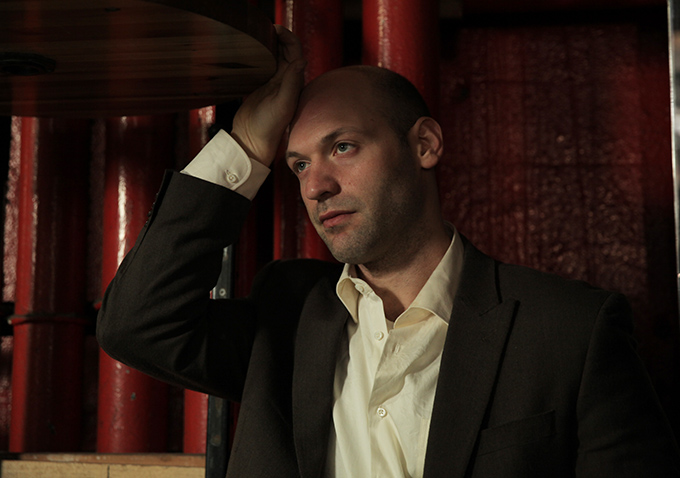
Bud Gordon coulda been a contendah. They called him “The Saint,” and Bud had it all. But as promising as Bud’s boxing career and talents were, he had an Achilles heel, or rather, a glass chin. So when the glove connected with kisser, Bud went down like a stone. Now, fallen on hard times and living in New Jersey instead of Manhattan, the down-on-his-luck Bud and his live-in girlfriend Ellen no longer live the glamorous life. In fact, they now live in a rather begrimed apartment and the realities of everyday life have hit them hard. But despite it all, Bud still dreams of regaining past glories. Maybe not getting his boxing career up and running, as that ship has passed, but the desire for some kind of redemption burns as bright as his competitive spirit once did.
No sooner than when Bud is at his lowest, like an apex predator zeroing in on a wounded animal, J.J. Cook turns up. A criminal, restaurateur and art connoisseur, the smooth talking J.J. appeals to Bud’s wounded ego and crumbled sense of identity. He can help Bud get his failed restaurant back on its feet. Even more tantalizing, J.J. could even have the gym–where Bud is helping train Kid Sunshine (Malcolm Xavier), an up-and-coming young boxing superstar–moved from the dregs of Jersey back into the limelight of Manhattan. All he has to do is make a teeny, tiny deal with the devil. Of course, by the time Bud realizes what he’s done–the boxer’s not that bright to begin with and easily lured in by the promise of restoring his name – J.J. owns him and and he’s being framed up for a murder. All he has to do to get scott free is convince Kid Sunshine to take a fall, and ruin his career in the process.
 Well written and composed by writer/director Noah Buschel (the underrated "Sparrows Dance" and "The Missing Person"), “Glass Chin” is a terrific noir look at compromise, faded glory and the weighty cost of personal integrity. Buschel’s eye is distinct, deliberate and carefully considered and “Glass Chin” has some tremendous mise-en-scene. Much of it is extremely simple but effective long takes, master shots, and the great use of negative space and other subtle techniques to inform the scene. This is the work of an underappreciated and sharp filmmaker. “Glass Chin” certainly makes the case that many more should sit up and take notice as his skills go beyond the carefully-crafted formalism.
Well written and composed by writer/director Noah Buschel (the underrated "Sparrows Dance" and "The Missing Person"), “Glass Chin” is a terrific noir look at compromise, faded glory and the weighty cost of personal integrity. Buschel’s eye is distinct, deliberate and carefully considered and “Glass Chin” has some tremendous mise-en-scene. Much of it is extremely simple but effective long takes, master shots, and the great use of negative space and other subtle techniques to inform the scene. This is the work of an underappreciated and sharp filmmaker. “Glass Chin” certainly makes the case that many more should sit up and take notice as his skills go beyond the carefully-crafted formalism.
Arguably, the right people are paying attention already, based on the quality of talent that has come together for this obvious labor of love. ‘Chin’ is anchored by its two wonderful lead performers, Corey Stoll playing the somewhat dim but well-intentioned pugilist Bud and Billy Crudup, who appears as the quietly menacing gangster. Stoll really shone in “House Of Cards” and he’s in top form once again here. But Crudup admittedly steals “Glass Chin,” with every frame. His unctuous snake is one of his most exciting performances in some time; it’s lean, controlled, deceptively jovial and ultimately ruthless.
 Boasting the strong supporting character-acting cast of Marin Ireland, Kelly Lynch, John Douglas Thompson, Brendan Sexton III, Michael Chernus and David Johansen from the New York Dolls, plaudits must also be given to Cuban-American actor Yul Vazquez, another scene-stealer who hilariously shines as one of J.J.’s chatty thugs that Bud is force to work with.
Boasting the strong supporting character-acting cast of Marin Ireland, Kelly Lynch, John Douglas Thompson, Brendan Sexton III, Michael Chernus and David Johansen from the New York Dolls, plaudits must also be given to Cuban-American actor Yul Vazquez, another scene-stealer who hilariously shines as one of J.J.’s chatty thugs that Bud is force to work with.
At 87 minutes, “Glass Chin” is compact, economical and arguably just a little bit slight. But the picture knows when and where to make its marks. Emotionally, the film is just where it needs to be, and though it’s certainly not sentimental, it’s not distant either, and takes a quietly soulful approach with its protagonist’s morality. Its sly humor is perhaps the ace up the sleeve–Buschel knows how to disarm a tense situation with the right combination of humorously dark blows, and he lands each and every one with hearty laughs.

“Glass Chin” occasionally misses its marks. There’s a few scenes early on where Ireland and Stoll are just too affected. Like two stage actors trying to one-up each other, their readings are either stilted or a little unnatural like they haven’t quite gotten into their groove yet. But at the end of the day this is a small quibble. Everyone in front of and behind the camera is doing top-notch work.
Measured, assured and featuring across-the-board strong performances, “Glass Chin” in many ways is a tiny little drama about the virtues of character. But its scale belies its heart, which is dented, but authentic and golden. [B+]
This is a reprint of our review from the 2014 Tribeca Film Festival.

